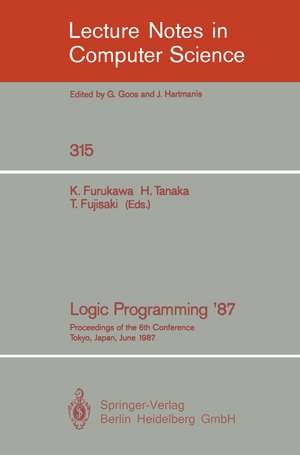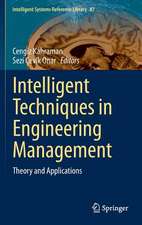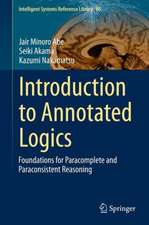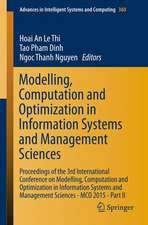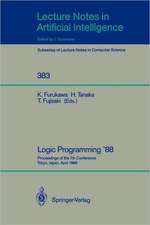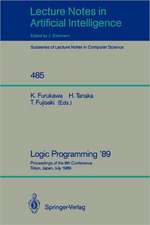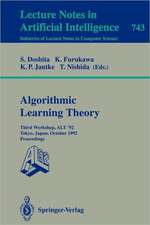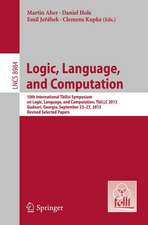Logic Programming '87: Proceedings of the 6th Conference Tokyo, Japan, June 22-24, 1987: Lecture Notes in Computer Science, cartea 315
Editat de Koichi Furukawa, Hozumi Tanaka, Tetsunosuke Fujisakien Limba Engleză Paperback – 22 iun 1988
Din seria Lecture Notes in Computer Science
- 20%
 Preț: 1061.55 lei
Preț: 1061.55 lei - 20%
 Preț: 307.71 lei
Preț: 307.71 lei - 20%
 Preț: 438.69 lei
Preț: 438.69 lei - 20%
 Preț: 645.28 lei
Preț: 645.28 lei -
 Preț: 410.88 lei
Preț: 410.88 lei - 15%
 Preț: 580.46 lei
Preț: 580.46 lei - 17%
 Preț: 427.22 lei
Preț: 427.22 lei - 20%
 Preț: 596.46 lei
Preț: 596.46 lei -
 Preț: 381.21 lei
Preț: 381.21 lei - 20%
 Preț: 353.50 lei
Preț: 353.50 lei - 20%
 Preț: 1414.79 lei
Preț: 1414.79 lei - 20%
 Preț: 309.90 lei
Preț: 309.90 lei - 20%
 Preț: 583.40 lei
Preț: 583.40 lei - 20%
 Preț: 1075.26 lei
Preț: 1075.26 lei - 20%
 Preț: 310.26 lei
Preț: 310.26 lei - 20%
 Preț: 655.02 lei
Preț: 655.02 lei - 20%
 Preț: 580.93 lei
Preț: 580.93 lei - 20%
 Preț: 340.32 lei
Preț: 340.32 lei - 15%
 Preț: 438.59 lei
Preț: 438.59 lei - 20%
 Preț: 591.51 lei
Preț: 591.51 lei - 20%
 Preț: 649.49 lei
Preț: 649.49 lei - 20%
 Preț: 337.00 lei
Preț: 337.00 lei -
 Preț: 449.57 lei
Preț: 449.57 lei - 20%
 Preț: 607.39 lei
Preț: 607.39 lei - 20%
 Preț: 1024.44 lei
Preț: 1024.44 lei - 20%
 Preț: 579.30 lei
Preț: 579.30 lei - 20%
 Preț: 763.23 lei
Preț: 763.23 lei - 20%
 Preț: 453.32 lei
Preț: 453.32 lei - 20%
 Preț: 575.48 lei
Preț: 575.48 lei - 20%
 Preț: 585.88 lei
Preț: 585.88 lei - 20%
 Preț: 825.93 lei
Preț: 825.93 lei - 20%
 Preț: 763.23 lei
Preț: 763.23 lei - 17%
 Preț: 360.19 lei
Preț: 360.19 lei - 20%
 Preț: 1183.14 lei
Preț: 1183.14 lei - 20%
 Preț: 340.32 lei
Preț: 340.32 lei - 20%
 Preț: 504.57 lei
Preț: 504.57 lei - 20%
 Preț: 369.12 lei
Preț: 369.12 lei - 20%
 Preț: 583.40 lei
Preț: 583.40 lei - 20%
 Preț: 343.62 lei
Preț: 343.62 lei - 20%
 Preț: 350.21 lei
Preț: 350.21 lei - 20%
 Preț: 764.89 lei
Preț: 764.89 lei - 20%
 Preț: 583.40 lei
Preț: 583.40 lei -
 Preț: 389.48 lei
Preț: 389.48 lei - 20%
 Preț: 341.95 lei
Preț: 341.95 lei - 20%
 Preț: 238.01 lei
Preț: 238.01 lei - 20%
 Preț: 538.29 lei
Preț: 538.29 lei
Preț: 334.53 lei
Preț vechi: 418.16 lei
-20% Nou
Puncte Express: 502
Preț estimativ în valută:
64.02€ • 66.43$ • 53.51£
64.02€ • 66.43$ • 53.51£
Carte tipărită la comandă
Livrare economică 15-29 martie
Preluare comenzi: 021 569.72.76
Specificații
ISBN-13: 9783540194262
ISBN-10: 3540194266
Pagini: 340
Ilustrații: VI, 327 p.
Dimensiuni: 155 x 235 x 18 mm
Greutate: 0.48 kg
Ediția:1988
Editura: Springer Berlin, Heidelberg
Colecția Springer
Seria Lecture Notes in Computer Science
Locul publicării:Berlin, Heidelberg, Germany
ISBN-10: 3540194266
Pagini: 340
Ilustrații: VI, 327 p.
Dimensiuni: 155 x 235 x 18 mm
Greutate: 0.48 kg
Ediția:1988
Editura: Springer Berlin, Heidelberg
Colecția Springer
Seria Lecture Notes in Computer Science
Locul publicării:Berlin, Heidelberg, Germany
Public țintă
ResearchCuprins
From unification to constraints.- CS-Prolog: A generalized unification based constraint solver.- Update propagation network — A framework for constraint programming.- Mendels: Concurrent program synthesis system using temporal logic.- Analogical program synthesis from program components.- Deriving a compilation method for parallel logic languages.- The art of building a parallel logic programming system or from zero to full GHC in ten pages.- of a package system into Prolog.- KPR: A logic programming language-oriented parallel machine.- A preliminary evaluation of a parallel inference machine for stream parallel languages.- Managing search in parallel logic programming.- Inductive inference of regular languages based on model inference.- Polymorphic type inference in Prolog by abstract interpretation.- Proving partial correctness of guarded horn clauses programs.- Knowledge representation and inference based on first-order modal logic.- Manipulation of embedded context using the multiple world mechanism.- Generating natural language responses appropriate to conversational situations - in the case of Japanese -.- An approach to speeding up the Prolog-based inference engine KORE/IE.- Test generation for large-scale combinational circuits by using Prolog.- Concurrent execution of Prolog transaction.
